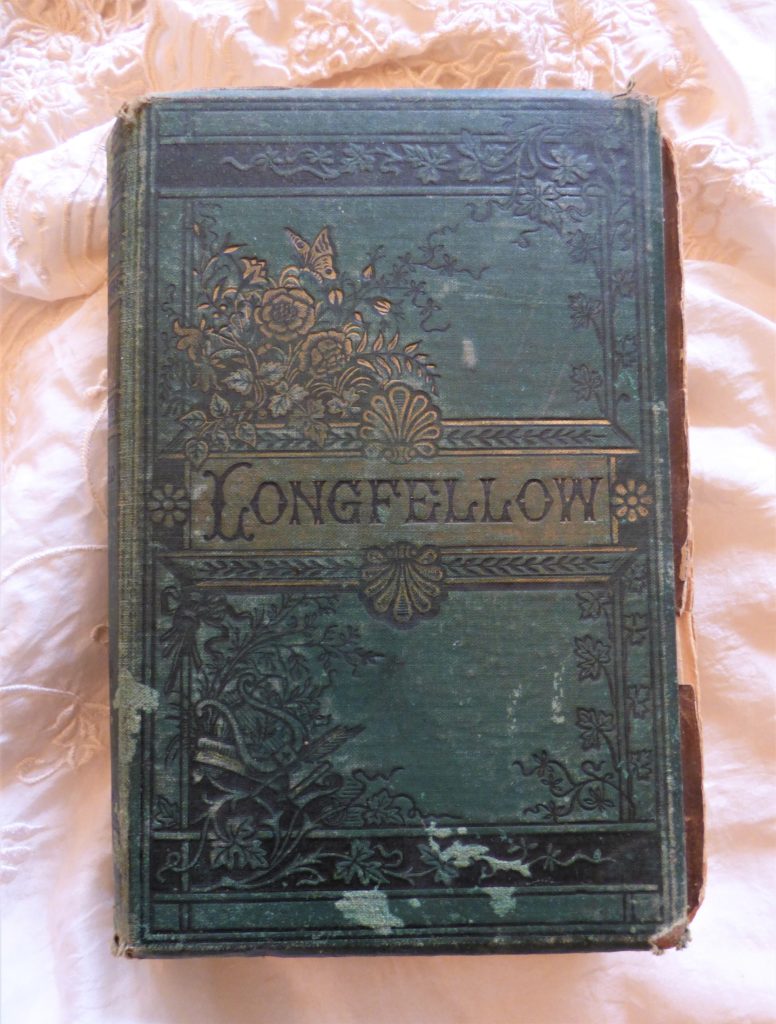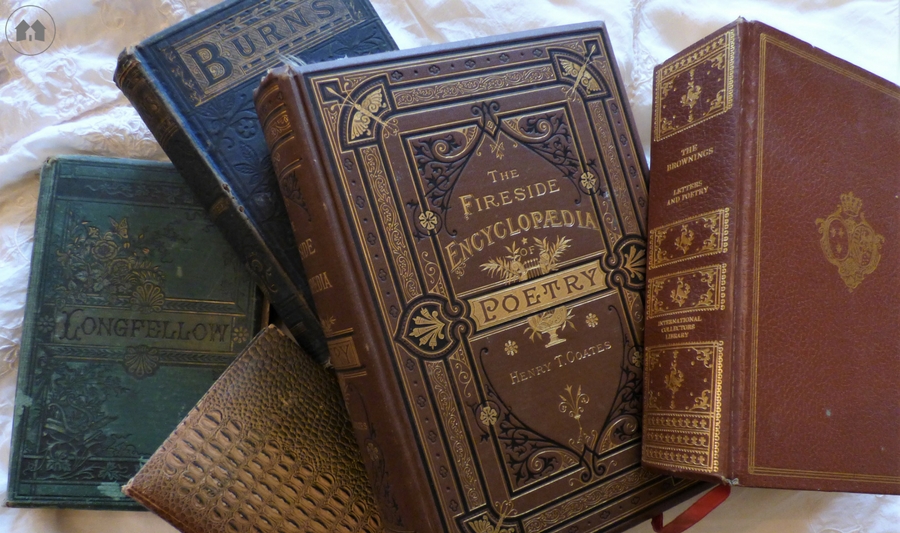Knowing today is National Poem In Your Pocket Day, I wanted to start off by saying that I love poetry. But that’s not entirely true; I really hate some of it. I am reminded of a book I once read where a woman gave her grandson a book of poetry. When he winced, she assured him that it was not the kind filled with frolicking lambs and daffodils. She said it was good poetry. I couldn’t agree more. So many people wince at the thought of reading poetry because they associate it with rhymes filled with meaningless musings. But good poetry can change your way of thinking, touch your soul, remain part of you forever. Poetry should make you feel something as you read the words. Not all words affect people the same way, so it’s up to you to decide what poetry speaks to you!
“Poetry is the spontaneous overflow of powerful feelings.”
~ William Wordsworth
I was fortunate enough to grow up in a house filled with books, many of them ancient tomes with cracking leather binding and gold lettering. It is not hard to tempt a child to open a book that looks like that, and lots of poetry books were among them. Introducing children to poetry is a tricking business. Much like teaching them to read, you want it to be a pleasurable experience, and one they will want to repeat. My dear Great-aunt Jane plied me with books my whole life; she introduced me to Shel Silverstein when I was about five. This man wrote poetry for the youthful-hearted and illustrated them with whimsical sketches. I read all of his books many times over to my sons, and to this day they can quote Silverstein poems. Most of his poems are humorously irreverent and will make adults laugh right along with the children. It’s hard to choose favorites, but I can still recite The Dragon of Grindly Grun word for word! However, many of his poems are also thought provoking ones about faith, love, and fitting in. The following poem never fails to move me:
The Little Boy and the Old Man
Said the little boy, ‘Sometimes I drop my spoon.’
Said the old man, ‘I do that too.’
The little boy whispered, ‘I wet my pants.’
‘I do that too,’ laughed the little old man.
Said the little boy, ‘I often cry.’
The old man nodded, ‘So do I.’
‘But worst of all,’ said the boy, ‘it seems
Grown-ups don’t pay attention to me.’
And he felt the warmth of a wrinkled old hand.
‘I know what you mean,’ said the little old man.
~ Shel Silverstein
You can incorporate poetry into your life and that of your children in many different ways. Each week I publish a poem on personal my blog, Ms. Sam Wears Dresses, to encourage people to read them. I have an old gumball machine for which I bought capsules filled with prizes. Then I printed poems on small bits of paper and inserted them into the balls. A sneaky way to give kids a treat and get them to read a bit of poetry! When I homeschooled, we would choose poems (myself along with the boys) to memorize and then recite at a monthly gathering.
Once you have kindled your children’s appreciation of poetry, incorporate it seamlessly into your schooling. There are so many amazing poems that celebrate historical moments or that encourage one along life’s path; ones that aren’t dry and boring at all. E.A. Poe’s poem, Eldorado, shows reveals a Conquistador in search of treasure. As he grows old he finds that the only streets of gold and true treasure are not on this earth. The Raven, by the same author, is a classic in the world of poetry.
Tennyson’s The Charge of the Light Brigade is a poem that brings to life a lone battle in the Crimean War. It rings with bravery amidst fear, as well as the sting of futility. If you are studying this period in history the black and white movie of the same name from 1936 is a wonderful accompaniment. Tennyson also wrote a book of wonderful epic poems, entitled Idylls of the King. I discovered this book in my mid-teens when I was obsessed with every Arthurian. All the poems recount stories of King Arthur, Lancelot, and the characters of the round table.

I found this copy of poems by Henry Wadsworth Longfellow at an auction when I was very young. It had locks of hair and flowers pressed between the pages, and the obvious affection it’s previous owner showed for it encouraged me to read it. Longfellow’s poem Excelsior is perhaps one of his most famous. It is a rousing work for a young person to read aloud. The words are a metaphor for the struggles and temptations in life and an encouragement to never stop striving, even to the end. One of my personal favorites is The Reaper and the Flowers. Writers’ poetry often gains greater significance when you find out more of their personal lives. Longfellow lost his first wife due to illness after a miscarriage. His second wife was using sealing wax and accidentally dropped a match onto her dress. Longfellow desperately tried to put out the fire, but could not save her. He carried such deep scars from the accident that shaving was painful and so grew the large beard that people associate with his image. His life was rife with sorrow, but filled with the quiet faith that God was in control of all. It is from this deep faith that joy is able to shine out through his poems.
Lots of people dismiss poems as romantic nonsense. They can be, but the ones I enjoy are symbols of enduring love. Consider this excerpt from Shakespeare’s sonnet Let Me Not to the Marriage of True Minds, “Love is not love, Which alters when it alteration finds, Or bends with the remover to remove: O, no! it is an ever-fixed mark, That looks on tempests and is never shaken…” It contains beautiful sentiment that reminds me of 1 Corinthians 13:4-7. For a romance style coupled with fairytale, try Keats’ ballad La Belle Dame sans Merci (the beautiful lady without mercy), or The Stolen Child by Yeats.
The poetry that captured me in my high school years was by an Englishman named Siegfried Sassoon. He served in World War 1. He was repeatedly commended for his bravery in battle — “Sassoon remained for one and a half hours under rifle and bomb fire collecting and bringing in our wounded” — but he became sickened and disillusioned by war. His poems are sometimes graphic in nature when capturing the weariness and brutality of trench warfare, without romanticizing it. His poems are such that you can read them as an accompaniment to any period of war and feel the intense emotion of the common soldier. I challenge you to read just two of his works, Aftermath and The Death Bed, and not be moved. When you do, remember all of our men and women in similar situations today. Such is the power of poetry that it can transcend the time when it was written.
Poetry is not always comforting and happy. It can be provoking, heart wrenching, or inspirational. Poems are a vehicle for the author to convey much emotion in a short passage. I encourage you to peruse different kinds and eras of poetry. You may prefer Romanticism over Epic, but you’ll never know until you read some. I encourage you to find just one poem that you really admire. Write it out on a piece of paper. A myriad of studies have shown that hand-writing something drastically raises your chance of remembering it. Put your special poem in your pocket. Every time you think of it, try to recite it from memory. Then take it out and look at it. Do this all day long. Chances are the words that really affect you will be the ones that stay with you. Who knows, years from now you may have them come to your mind as a form of comfort or a rousing call to action. Put a Poem in Your Pocket, and you never know where it will lead!
“For poems are not words, after all, but fires for the cold, ropes let down to the lost, something as necessary as bread in the pockets of the hungry.”
~ Mary Oliver

Beautifully written! Such a great way to explain just how wonderful words are.